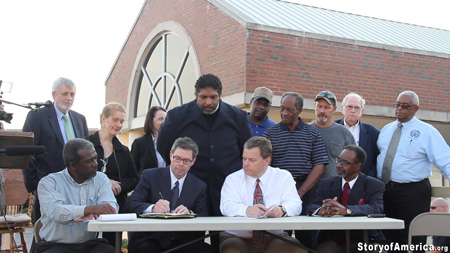NOTE: Vidant Health declined to be interviewed for this web series, and declined our offer to submit a statement on this issue.
In September 2013, Vidant Health, a system of hospitals serving 29 counties in eastern North Carolina, that it would be closing the Vidant Pungo Hospital in Belhaven, NC, which they had acquired less than years earlier. Vidant has announced plans to close the hospital on April 1st and demolish the building. It plans to build a new 24-hour clinic that can turn away people who lack insurance, and does not offer emergency care.
 The closest hospital with emergency care would be Vidant Beaufort Hospital in Washington, NC which is located 30 miles (on two-lane rural roads) away from Vidant Pungo Hospital. In life-threatening emergencies such as car accidents or strokes, adding 30 miles can have fatal consequence. From the eastern side of Hyde County, which is currently served by Vidant Pungo Hospital, it is a 80 mile drive to Vidant Beaufort Hospital.
The closest hospital with emergency care would be Vidant Beaufort Hospital in Washington, NC which is located 30 miles (on two-lane rural roads) away from Vidant Pungo Hospital. In life-threatening emergencies such as car accidents or strokes, adding 30 miles can have fatal consequence. From the eastern side of Hyde County, which is currently served by Vidant Pungo Hospital, it is a 80 mile drive to Vidant Beaufort Hospital.
When Vidant Health took control of the community hospital which opened in 1948, it signed a contract promising that the hospital would remain open, and that Vidant would improve services. Instead, Vidant stripped out equipment, beds, and services that had brought in revenue for the hospital, and added a six-figure on the salary for an executive manager who visited the hospital only once a week.
At the time of the purchase, Pungo Hospital was losing 1 million dollars a year. Hospitals designated by the government as Critical Access Hospitals are not designed to make money, but rather to ensure that people in rural areas have access to emergency and preventative healthcare. Knowing that patients would be forced to travel to another hospital Vidant had recently acquired, it seemed like a common sense move to consolidate the two operations. If neighboring Hyde County — one of the largest in counties in North Carolina — had a hospital of its own, perhaps that argument could have been made. But forcing people who already travel 50 miles for emergency care to now travel 80 miles will put lives in danger.
Vidant claims that it could not make the Pungo Hospital viable due to the building’s deteriorated state and the lack of revenue. This assessment is fiercely disputed by Dr. Charles Boyette, the hospital’s former chief of staff, former mayor and town physician.
 Belhaven’s current Mayor Adam O’Neal believes that Vidant Health never intended to improve the management of Vidant Pungo Hospital to make it more efficient and had planned to close it down from the outset, shifting patients now served by Pungo Hospital to Vidant’s larger hospitals in Washington and Greenville.
Belhaven’s current Mayor Adam O’Neal believes that Vidant Health never intended to improve the management of Vidant Pungo Hospital to make it more efficient and had planned to close it down from the outset, shifting patients now served by Pungo Hospital to Vidant’s larger hospitals in Washington and Greenville.
According to Vidant Health and heath care advocates at the North Carolina Justice Center, the state government’s decision to reject federal dollars for Medicaid expansion made it much more difficult for this hospital to operate without losing money. Under the Affordable Care Act, adjustments were made to the way in which Medicaid reimbursements are paid, with the expansion of Medicaid factored into that equation. Thus, states that refuse to accept this funding and allow its residents health insurance are doing more damage to struggling hospitals than they realize.
NAACP and U.S. Department of Justice step in
March 15, 2014: The U.S. Dept. of Justice has offered mediation to Vidant Health and the North Carolina NAACP to resolve a Title 6 complaint under the Civil Rights Act of 1964. Vidant Pungo Hospital in Belhaven, NC, which serves 23K people in Beaufort and Hyde counties, was purchased by Vidant Health two years ago under a contractual agreement stipulating that Vidant would keep the hospital open and expand services.
Six months ago, Vidant announced it would be closing the hospital instead, forcing patients to travel an additional 30 miles to another hospital recently purchased by Vidant, in Washington, NC.
Rev. Dr. William Barber, president of the North Carolina NAACP, has travelled to Belhaven, NC three times this year to join in local efforts to prevent the hospital’s closing. In part 2 of our video series, and, in more detail in here, Rev. Barber explains the complaint.
NAACP attorney Al McSurely said, “We have reason to believe that there will be talks between both sides to see whether an agreement can be made to slow up the decision to tear the hospital down until after the community can negotiate a better outcome, with the government’s help.”
Residents of Belhaven, of Beaufort County, and of Hyde County welcomed encouraging news for the second consecutive day after many in the area had given up hope. On Friday, March 14, the Beaufort County Board of Commissioners voted in an emergency session (see video) to give the hospital a new lease on life. By a 4 to 3 vote, the commissioners decided to lend $2 million toward the continued operating of the hospital, under different management. The pre-conditions are various and complex, but the decision provides a window of opportunity if the Justice Department mediation fails.
March 21, 2014 Story of America was not allowed inside, but we did our best to document the first two days of mediation between Vidant Health and the North Carolina NAACP. Mediation will continue on Wednesday March 26. Unconfirmed reports from Belhaven indicate that Vidant Health intends to go forward with its plan to close the hospital on April 1, and demolish the building soon after.
The two defining power plays of this story thus far are:
(1) Vidant Health’s ability to influence Pantego Creek, LLC, with whom it signed the contract to purchase the hospital, NOT to hold them accountable for violating that contract
(2) The North Carolina NAACP’s federal complaint, citing Title 6 of the Civil Rights Act which prohibits entities that receive federal funds from spending them in ways that discriminate against minorities. Whether intended or not, Vidant’s decision to close the Belhaven hospital would have a disproportionate impact on African Americans, thousands of whom have lived in the region since emancipation.
March 26, 2014: In a joint statement, the North Carolina NAACP and Vidant Health announced a settlement that will allow Belhaven’s hospital to remain open. Vidant Heatlh will operate the hospital and its emergency facilities up until a July 1st handover to a new, community-based entity to run the hospital indefinitely. On Thursday April 3, the parties will hold a joint press conference to announce a strategic plan that could become a model for addressing the “medical desert” crisis impacting America’s rural communities.
CLICK HERE for written statement.
 April 3, 2014: What you are looking at here is a “coming together,” as Rev. Dr. William Barber likes to put it, of black and white, conservative Republicans and the historically progressive NAACP, and, an immensely powerful corporation agreeing to work together with some of the poorest, least powerful people in our country.
April 3, 2014: What you are looking at here is a “coming together,” as Rev. Dr. William Barber likes to put it, of black and white, conservative Republicans and the historically progressive NAACP, and, an immensely powerful corporation agreeing to work together with some of the poorest, least powerful people in our country.
If there were at times you didn’t believe this was possible, don’t feel bad. I didn’t. As I filmed the March 25 prayer vigil, I remember feeling deep compassion, almost pity for these people in a hopeless situation. “Prayer changes things,” the Deacon said, and the Mayor nodded his head. The sun was setting. It was the hospital’s darkest hour — just a week before it was scheduled to be closed and then demolished.
But a dawn awaited just beyond the horizon, and this time, it brought with it incredible news. The next day, a settlement was announced, and it was made official in the signing ceremony you see in the photo above: Dr. David Herman, president and CEO of Vidant Health, Inc, signs the agreement mediated by the US Dept. of Justice at the request of the North Carolina NAACP to keep Vidant Pungo Hospital open.
However, this was not the end of the struggle. This video explains how the settlement was broken less than 3 months later:
More on the Night of The Door Slam
On January 8, 2014, Mayor O’Neal asked the Belhaven Town Council to approve funds that would allow Rural Community Hospitals of America (RCHA) to conduct the in-depth study of Vidant Pungo Hospital’s prospects and financial outlook. On Feb. 24, RCHA presented their findings to the Town Council and a packed house of concerned citizens, the overwhelming majority of whom wanted the hospital not to be shut down.
This put additional pressure on Vidant Health and the four managers of Pantego Creek, LLC who together had made every effort to argue the hospital was not viable, and, who, most believe, had made an agreement to close the hospital long before RCHA study was completed.
The purpose of the Pantego Creek LLC meeting on February 25th was to hear a business plan from RCHA, contradicting Vidant Health’s claim that the hospital cannot be run more efficiently — RCHA has managed more than 200 small towns across the country.
The meeting on February 25th was called, not by the managers of Pantego Creek, LLC, but by the rank and file members, the majority of whom signed the paperwork necessary to call the meeting during a signature drive led by Mayor O’Neal, and two members of the LLC, Town Councilman Julian Goff and Dr. Boyette.
When Councilman Goff arrived at the Belhaven Civic Center that evening, he found that the managers of Pantego Creek, LLC had their own agenda for the meeting, which included barring the media and the public, and, making an argument to convince the LLC’s voting members that no action should be taken to try to keep the hospital open.
While lawyers for the two opposing sides negotiated over whether Mayor O’Neal would be allowed to speak at the meeting, representatives from RCHA presented their plan to operate the hospital on behalf of Pantego Creek, LLC. After a number of other speakers (on this we have few details because we were not allowed inside), Dr. Boyette, who is a member, was allowed to speak but only for a short period.
We learned after the meeting why members of the LLC were apprehensive about reassuming financial responsibility for the hospital. Even if they could get the hospital back from Vidant Health, RCHA’s plan required $3 million to pay for the transition due to steps taken to close the hospital, and, years of mismanagement. In a letter signed by the LLC’s managers, the voting members are told that they would be personally responsible for coming up with this money, breaking down to nearly $30,000 per member. Under North Carolina statutes governing LLCs, which stands for limited liability company, shareholders and members of LLCs are not personally liable for losses or expenses, in fact, offering such protection to business owners is the purpose of forming an LLC, or any corporation. But the $30,000 price tag created enough confusion and apprehension to get the vote that Vidant Health, Inc. desired.
O’Neal, Boyette, and others who have fought to keep the hospital have argued that $3 million or more might result from a legal settlement, if Pungo Creek, LLC decided to sue Vidant Health for breach of contract. O’Neal has also argued that the funds could come from private sources, and the counties that the hospital serves (and, on March 14, O’Neal would be partially vindicated, when Beaufort County offered a $2 million loan).
After the meeting, it was clear that the managers of Pantego Creek, LLC — if not also the rank and file — would not be suing Vidant Health for breach of contract, and would likely not take any step that was not in the interest of Vidant Health, including steps that would allow the hospital to remain open under different management, unless something drastically changed.
Voting members of Pantego Creek, LLC are mostly descendants of the financial contributors who made it possible for the hospital to open its doors in 1948 and stay open since then. Although we could not get into the meeting, we did film through the only window they failed to shutter. We could see that a Vidant Health board member, Arthur H. Keeney, III was in attendance (Keeney is also a member of Pantego Creek, LLC). We asked Mr. Keeney for an interview as he left the meeting and he said, “No comment.”
Back in January, a public relations representative for Vidant Health returned our call, but declined to be interviewed for this web series, declined to recommend anyone else from Vidant Health to be interviewed, and declined our offer to submit a statement on this issue. We have renewed our attempts to get Vidant Health’s perspective in recent days. Since completion of Part 1 of our video series, we have learned that Pantego Creek, LLC intends to go along with Vidant Health’s plan to demolish the hospital.
One of the reasons why so many people are upset about the Vidant Pungo Hospital closing is the fact the Vidant Health officials did not consult the people in the town, the mayor, the town council, or Dr. Boyette, who was the chief of staff of the hospital and a respected leader in the community.
Please support Story of America with a tax deductible donation.
